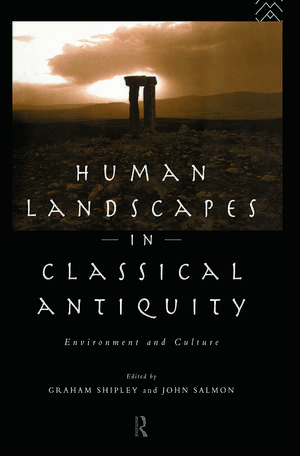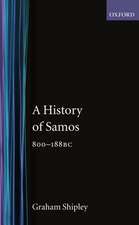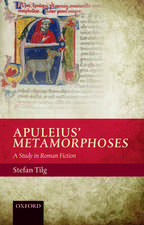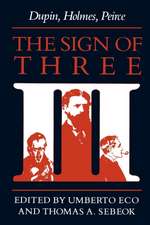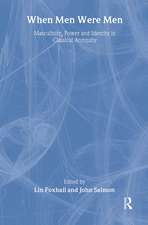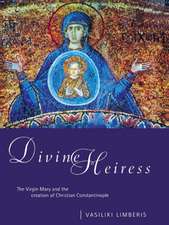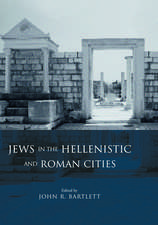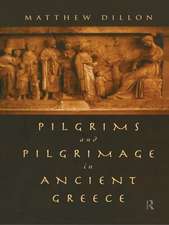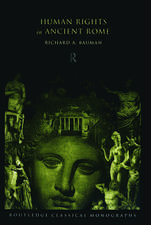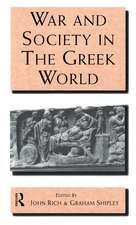Human Landscapes in Classical Antiquity: Environment and Culture: Leicester-Nottingham Studies in Ancient Society
Editat de John Salmon, Graham Shipleyen Limba Engleză Paperback – 11 iul 2011
This volume shows how Greeks and Romans worked hand in hand with their natural environment and not against it. It represents an outstanding collaboration between the disciplines of history and archaeology.
| Toate formatele și edițiile | Preț | Express |
|---|---|---|
| Paperback (1) | 303.85 lei 6-8 săpt. | |
| Taylor & Francis – 11 iul 2011 | 303.85 lei 6-8 săpt. | |
| Hardback (1) | 766.65 lei 6-8 săpt. | |
| Taylor & Francis – 2 mai 1996 | 766.65 lei 6-8 săpt. |
Din seria Leicester-Nottingham Studies in Ancient Society
-
 Preț: 415.24 lei
Preț: 415.24 lei -
 Preț: 366.85 lei
Preț: 366.85 lei -
 Preț: 487.02 lei
Preț: 487.02 lei -
 Preț: 501.45 lei
Preț: 501.45 lei -
 Preț: 363.00 lei
Preț: 363.00 lei -
 Preț: 488.29 lei
Preț: 488.29 lei -
 Preț: 368.76 lei
Preț: 368.76 lei - 18%
 Preț: 1111.55 lei
Preț: 1111.55 lei
Preț: 303.85 lei
Preț vechi: 343.75 lei
-12% Nou
Puncte Express: 456
Preț estimativ în valută:
58.16€ • 60.49$ • 48.74£
58.16€ • 60.49$ • 48.74£
Carte tipărită la comandă
Livrare economică 14-28 martie
Preluare comenzi: 021 569.72.76
Specificații
ISBN-13: 9780415692472
ISBN-10: 0415692474
Pagini: 358
Dimensiuni: 138 x 216 mm
Greutate: 0.66 kg
Ediția:1
Editura: Taylor & Francis
Colecția Routledge
Seria Leicester-Nottingham Studies in Ancient Society
Locul publicării:Oxford, United Kingdom
ISBN-10: 0415692474
Pagini: 358
Dimensiuni: 138 x 216 mm
Greutate: 0.66 kg
Ediția:1
Editura: Taylor & Francis
Colecția Routledge
Seria Leicester-Nottingham Studies in Ancient Society
Locul publicării:Oxford, United Kingdom
Recenzii
'The editors are to be congratulated for assembling a collection of such uniform interest and excellence.' – Classics Ireland
'I found this book stimulating and thought-provoking.' – JACT Review
'This book places individuals back in environmental contexts which have become increasingly dehumanised.' – Oxbow Book News
'One of the strengths of this excellent collection of papers is the range of disciplines represented by the contributors. ' – Landscape History
'Human Landscapes has shown how human use of and intervention in the natural environment has major social and even cultural implications for the world of classical antiquity.' – The Classical Review
'Human Landscapes in Classical Antiquity is a marvellous book, demonstrating how there are crucial areas of the ancient experience that still await systematic exploration.' – Mark Humphries, National University of Ireland
'I found this book stimulating and thought-provoking.' – JACT Review
'This book places individuals back in environmental contexts which have become increasingly dehumanised.' – Oxbow Book News
'One of the strengths of this excellent collection of papers is the range of disciplines represented by the contributors. ' – Landscape History
'Human Landscapes has shown how human use of and intervention in the natural environment has major social and even cultural implications for the world of classical antiquity.' – The Classical Review
'Human Landscapes in Classical Antiquity is a marvellous book, demonstrating how there are crucial areas of the ancient experience that still await systematic exploration.' – Mark Humphries, National University of Ireland
Cuprins
1: Ancient history and landscape histories; 2: Ecology and pseudo-ecology: the example of ancient Greece; 3: Feeling the earth move: cultivation techniques on steep slopes in classical antiquity; 4: The uses of the uncultivated landscape in modern Greece: a pointer to the value of the wilderness in antiquity? 1; 5: The countryside in classical Greek drama, and isolated farms in dramatic landscapes; 6: Ancient hunting: from Homer to Polybios; 7: Where was the ‘wilderness' in Roman times?; 8: Rome and the management of water: environment, culture and power 1; 9: First fruit? The olive in the Roman world; 10: Barren fields? Landscapes and settlements in late Roman and post-Roman Italy; 11: Nature and views of her landscapes in Pliny the Elder; 12: Cosmic sympathies: nature as the expression of divine purpose
Descriere
Human Landscapes in Classical Antiquity shows how today's environmental and ecological concerns can help illuminate our study of the ancient world. The contributors consider how the Greeks and Romans perceived their natural world, and how their perceptions affected society.
